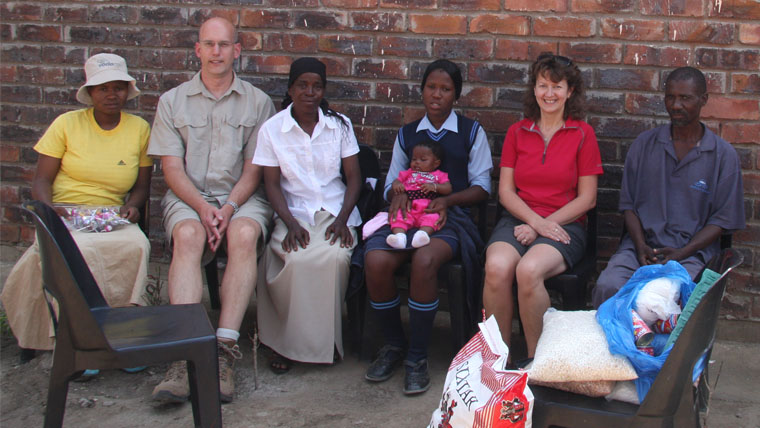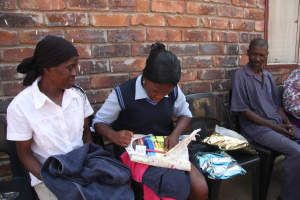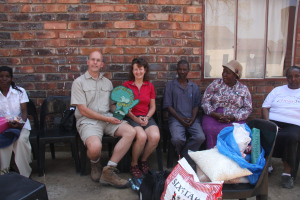Bitter Sweet Time With Our Sponsored Child in South Africa
Following on from his previous blog James Butler, a World Vision Child Sponsor, describes the bitter sweet time he spent with his sponsored child’s family.

We left the school and drove round to Dieketseng’s house - the signs of progress were immediately evident. A tarmac road now runs through her village, new since our last visit in 2009. What difference does this make, when so few people have cars? Apparently, tarred roads mean the taxi-minibuses will now venture into the village, making travelling to work quicker and more feasible. Whilst employment is still scarce, improved travel links makes getting one of the few jobs that bit easier.
The new road means we arrive at Dieketseng’s house from a different direction. We wouldn’t have recognised it anyway, because a whole new building has been built in their garden. Bellina explains that this is an “RDP house” – a government project that helps families in need. This new property has electricity, and they at last have long-drop toilets in the garden. Boasting four rooms rather than the two in the old house, it gives Dieketseng’s family so much more space – and she at last has her own bedroom. This is a huge improvement in their day to day existence, which is pleasing to see.
We are greeted by Joseph and Angelique, Dieketseng’s parents, and it is like we are returning to our own family. They both look very unwell, and are struggling to breathe, but we respect their privacy and do not ask directly about their health. Although, Ledile teases Joseph about the impact of his roll-ups on his coughing, especially as he uses strips of old newspaper in place of a Rizla!
Dieketseng proudly introduces us to her niece, only a few weeks old, and she is adorable, though the presence of alien white faces seems to distress the new-born, so we retreat to a safe distance!
Joseph says (through Ledile as interpreter) how he has missed us, and thought of us a lot over the last three years. He explains how much they value our sponsorship, and the love we show for them and for Dieketseng. We explain that we have a picture of her in our lounge and our office at home, and think of them all every day.
 We present our gifts, and it is a strange feeling. In England we would take a bottle of wine or some flowers when we visit, and it is slightly uncomfortable to present bags of mealie meal, salt and beans, ferried from the car in a wheelbarrow. But they seem genuinely thankful, and with virtually no income coming into the household of five people, including a new-born infant, they are probably the most useful things we can bring.
We present our gifts, and it is a strange feeling. In England we would take a bottle of wine or some flowers when we visit, and it is slightly uncomfortable to present bags of mealie meal, salt and beans, ferried from the car in a wheelbarrow. But they seem genuinely thankful, and with virtually no income coming into the household of five people, including a new-born infant, they are probably the most useful things we can bring.
We want Dieketseng to feel special though, so we have some small gifts for her. Some clothes and some materials for school, which she greets with equal excitement. We tell her she can practice writing her English in the writing pad we have given her. Seeing her open the present, we are reminded of the first time we met her, when she just held the gift-wrapped parcel, because she had never been given anything wrapped in her life and didn’t know what to do. Humbling.
Dieketseng disappears and returns with a gift for us. How can you explain that the opportunity to meet them, and help their community in some way, is all the gift we could ever need? Placed in just a carrier bag, it is still a joy to receive – and it is a wall ornament in the shape of Africa, with our names on. simple but beautiful. It transpires it was made by Dieketseng’s uncle.
 This is such a strange time. We have looked forward to this moment for years, and the minutes just ebb away. With the language barrier and even greater gulf in our daily living standards, what on earth does one talk about? So, all of us fall back on what families do all over, we put pressure on the teenager by asking about their schooling, and what career plans they have. Dieketseng has three more years at school, after which she wants to join the police force (last time she wanted to be a nurse!).
This is such a strange time. We have looked forward to this moment for years, and the minutes just ebb away. With the language barrier and even greater gulf in our daily living standards, what on earth does one talk about? So, all of us fall back on what families do all over, we put pressure on the teenager by asking about their schooling, and what career plans they have. Dieketseng has three more years at school, after which she wants to join the police force (last time she wanted to be a nurse!).
Ledile explains to us that now Dieketseng must work hard to get the best grades. Dieketseng looks at her feet, feeling the pressure, and I can just imagine my nieces and nephews in the same situation in England. I wonder what Northern Sotho is for “Whatever”. We want to see lots of the successful projects around the ADP and Dieketseng must get back to school, but none of us seem to want this time to end. Will we ever come back, will we see them again, how will their lives play out in the meantime? The briefness of this time with the family is precious and painful at the same time.
Before we go, Dieketseng dissappears into the house again (we are sat on plastic chairs in the shade of the wall in the garden – a relief because it is 35 degrees and the sun is scorching, and my bald head wasn’t designed for African skies). She emerges with another of these Africa-shaped wall hangings, but this time it isn’t a gift for us. This is their wall-hanging, that they have in their home. As we realise what it is, lumps form in throats and tears form in our eyes. It is headed “Our Family” and is a picture of us with all of Dieketseng’s family from our last visit. They have so few possessions, and almost nothing ornamental in the whole house, yet here is a picture of us, as part of their family. The emotion rips through my mind, and it is hard not to weep. I feel so lucky to have experienced this love.
But now we must leave, and anguished hugs are exchanged with everyone, except the newborn, who we have traumatised enough by our mere presence it seems. We walk as slowly as possible to the car, dragging out the experience and milking every moment, but before we know it, we are dropping Dieketseng back at school, she is walking back to her classmates and we are fighting back the tears. The sweetness of sharing time with her is, in that moment, overwhelmed by the bitter feeling of having to part. Deep breaths, and a few tears, in the car and we are off to see some of the community projects the ADP is supporting. I’ll tell you more about some of these fantastic projects in tomorrow’s blog.